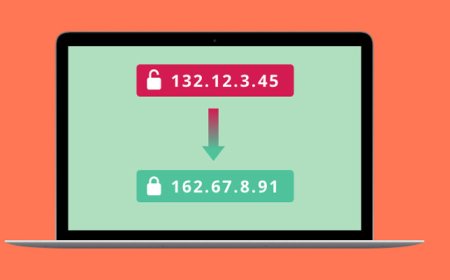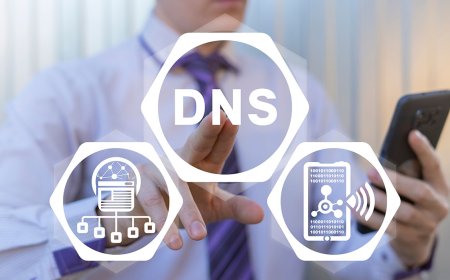Network Security
When it comes to network security, there are several crucial aspects that individuals and organizations should consider to ensure their data and systems are ...

When it comes to network security, there are several crucial aspects that individuals and organizations should consider to ensure their data and systems are protected from potential threats.
One of the most important steps in network security is implementing strong passwords and authentication protocols. Weak passwords and insufficient authentication measures can leave networks vulnerable to hacking attempts and unauthorized access by malicious actors.
Another crucial aspect of network security is keeping software and devices up-to-date with the latest security patches and updates. Hackers often exploit vulnerabilities in outdated software, so staying current with updates can help prevent these attacks.
Firewalls and intrusion detection systems are also essential components of network security. Firewalls act as a barrier between a local network and external networks, helping to prevent unauthorized access and filter out potentially malicious traffic. Intrusion detection systems monitor network traffic for suspicious activity and alert administrators if any anomalies are detected.
Regular network monitoring and log analysis can also help identify potential threats and unusual activity. By monitoring network traffic and analyzing logs, administrators can quickly detect security breaches and take appropriate action to mitigate any damage.
Finally, employee education and training on network security best practices is vital for maintaining a secure network. Employees should be aware of the risks associated with accessing unsecured networks and using personal devices on the company’s network, as well as the importance of strong passwords and regular software updates.
In conclusion, network security is a critical component of any organization’s cybersecurity strategy. By implementing strong passwords, using firewalls and intrusion detection systems, regularly updating software, monitoring network activity, and educating employees on best practices, organizations can significantly reduce their risk of falling victim to cyberattacks.
Types of Network Security
In today’s world, where businesses have become more reliant on technology, network security is of utmost importance. Network security refers to the protection of a network infrastructure and its components from unauthorized access, theft, damage, or misuse.
There are various types of network security measures that businesses can implement to ensure the safety of their network. Firewall security is one such measure that is widely used by businesses. A firewall acts as a barrier between the internal network and the external world, filtering out unauthorized traffic and allowing only authorized traffic to pass through.
Another type of network security is intrusion detection and prevention systems (IDPS). These systems monitor network traffic for any suspicious activity and can take steps to prevent any potential security breaches. IDPS can be either host-based or network-based, depending on where they are installed.
Virtual private networks (VPNs) are another popular form of network security. VPNs allow employees to access the company’s network securely from remote locations. They provide encryption and authentication to protect data transmitted over the internet.
Antivirus software is an essential component of network security. It helps to detect and remove malicious software, such as viruses, worms, and Trojans, which can cause significant damage to a network.
Wireless security is also crucial for businesses that use wireless networks. Wireless security measures include Wi-Fi protected access (WPA) and WPA2, which provide encryption for wireless traffic, and media access control (MAC) filtering, which restricts access to a wireless network based on MAC addresses.
Lastly, physical security measures should not be overlooked. Physical security measures include access controls, such as biometric authentication, security cameras, and alarms, which help to prevent unauthorized physical access to a network.
In conclusion, network security is critical for businesses to protect their network infrastructure and sensitive data. Implementing the right mix of network security measures can significantly reduce the risks of security breaches and ensure the safety of both the business and its clients.
Network Security Best Practices
In today’s digital age, network security has become a top priority for businesses across every industry. Cyber threats are constantly evolving, and it’s essential to stay up-to-date on the latest best practices for protecting your network from malicious attacks. In this article, we’ll explore some of the most effective network security best practices you can implement to safeguard your business.
One of the first steps to take in securing your network is to use strong passwords. This may seem like a simple step, but it’s crucial to use complex, unique passwords for all accounts and devices. Never reuse passwords across multiple accounts, and consider using a password manager to generate and store secure passwords.
Another critical aspect of network security is keeping software and hardware up-to-date with the latest patches and updates. This includes not only operating systems and antivirus software but also routers, firewalls, and other network hardware. Failing to update software and hardware leaves vulnerabilities that cybercriminals can exploit.
Additionally, it’s important to implement access controls to limit who has access to sensitive information. This can include user permissions and multi-factor authentication to ensure only authorized personnel have access to critical data.
Another effective network security best practice is to use encryption to protect data that is transmitted over your network. This can prevent cybercriminals from intercepting and accessing confidential data such as credit card numbers or personal information.
Finally, it’s essential to regularly back up all data stored on your network. This ensures that even if your system is breached, you can quickly restore lost data and resume business operations.
In conclusion, implementing network security best practices is crucial to protect your business from cyber threats. Strong passwords, regular updates and patching, access controls, encryption, and data backups are just a few of the many steps you can take to keep your network secure. By prioritizing network security, you can help safeguard your business and ensure the safety of your customers’ data.
Importance of Network Security
Network security is essential for any business, no matter its size. It refers to protecting the network and its components from unauthorized access, misuse, modification, or destruction. The importance of network security cannot be overstated as it ensures the confidentiality, integrity, and availability of data, which can be critical to the success of a business.
The first reason why network security is crucial is that it protects sensitive information from falling into the wrong hands. Unauthorized access to financial records, customer data, or trade secrets could lead to severe consequences, including loss of reputation, legal liability, and financial losses. Implementing robust network security measures prevents such incidents from occurring, safeguarding both the business and its clients.
The second reason why network security is crucial is that it helps maintain business continuity. Cyberattacks, viruses, or malware can cause network downtime, which can result in significant financial losses. Network security measures such as firewalls, intrusion detection systems, and antivirus software can prevent such events from happening, ensuring that the business remains operational at all times.
Another essential factor highlighting the importance of network security is regulatory compliance. Many industries have specific rules and regulations regarding data protection and security. Failing to comply with these regulations could result in hefty fines, lawsuits, and even imprisonment. Implementing network security measures ensures that the business complies with these regulations, avoiding potential legal liabilities.
Lastly, network security is vital for maintaining trust between businesses and their clients. With an increasing number of cyber attacks and data breaches, customers are becoming more concerned about the safety of their personal information. Implementing robust network security measures assures customers that their data is safe, instilling trust and confidence in the business.
In conclusion, network security plays a critical role in protecting sensitive data, maintaining business continuity, complying with regulations, and maintaining trust between businesses and their clients. Businesses must prioritize network security by implementing robust measures to safeguard their networks and data against potential threats.
Network Security Tools and Techniques
As society becomes increasingly reliant on technology, cybersecurity has become a major concern for businesses and individuals alike. Network security is a crucial component of overall cybersecurity, and there are many tools and techniques that can be used to ensure the safety and integrity of networks.
One important network security tool is the firewall. A firewall is a piece of software or hardware that monitors incoming and outgoing network traffic and blocks any unauthorized access. Firewalls can be configured to allow or block specific types of traffic based on factors such as the source or destination IP address, port number, and protocol.
Another useful tool for network security is intrusion detection and prevention (IDP) systems. IDP systems monitor network traffic for suspicious activity and can automatically block any attempted attacks. These systems use various techniques to detect potential threats, such as signature-based detection (looking for known attack patterns), anomaly-based detection (identifying unusual behavior), and behavioral analysis (looking for deviations from normal usage patterns).
Encryption is another important technique for securing network traffic. Encryption involves using algorithms to scramble data so that it can only be read by authorized parties who possess the decryption key. This can help prevent eavesdropping and data theft in transit.
Finally, regular network vulnerability assessments can help identify and address any weaknesses in network security. These assessments involve scanning networks for known vulnerabilities and testing them to see if they can be exploited. Once weaknesses are identified, steps can be taken to patch or mitigate them.
In conclusion, network security is essential for protecting sensitive information and ensuring the smooth operation of businesses and other organizations. By utilizing tools such as firewalls and IDP systems, implementing encryption, and regularly conducting vulnerability assessments, network administrators can help ensure the safety and security of their networks.
Network Security in the Cloud
As more businesses move their data and applications to the cloud, network security has become an increasingly important concern. While the cloud offers many benefits such as flexibility, scalability, and cost savings, it also presents unique challenges when it comes to ensuring the privacy and security of sensitive information.
One of the biggest risks associated with cloud computing is the potential for unauthorized access to data. With so much information stored in one place, a single breach could have devastating consequences. To mitigate this risk, it’s essential to implement strong authentication and access control measures, such as multi-factor authentication and role-based access controls.
Another key consideration when it comes to network security in the cloud is data encryption. Encryption is a powerful tool for protecting sensitive data from prying eyes, but it must be implemented correctly to be effective. It’s critical to use strong encryption algorithms, keep encryption keys secure, and ensure that data is encrypted both at rest and in transit.
Beyond these technical measures, it’s important to establish clear policies and procedures around data management and handling. This includes everything from data classification and retention to incident response and disaster recovery. By defining clear guidelines for how data should be handled and protected, organizations can minimize the risk of data loss or exposure.
Finally, it’s important to stay up-to-date on the latest threats and vulnerabilities in the cloud environment. This means regularly reviewing and updating security protocols, monitoring for anomalous activity, and implementing patches and updates as needed. By staying vigilant and proactive, organizations can better protect themselves against cyber threats and ensure the security and integrity of their data in the cloud.
In conclusion, network security in the cloud is a complex and ever-evolving challenge, but with the right strategies and tools in place, it’s possible to minimize risk and protect your data and privacy. Whether you’re a small business or a large enterprise, taking the time to develop a comprehensive security plan is essential for success in the cloud.
Future of Network Security
When it comes to the future of network security, one thing is for sure: the landscape is constantly evolving. As technology advances and cyber threats become more sophisticated, it’s essential for companies and individuals alike to stay ahead of the game.
One trend that’s likely to shape the future of network security is the rise of artificial intelligence (AI). Already, AI-powered tools are being used to monitor networks and identify potential threats in real-time. As these tools become more advanced, they’ll be able to detect and respond to attacks with even greater speed and accuracy.
Another area of focus will be the Internet of Things (IoT), which refers to the growing number of devices connected to the internet. From smart homes to industrial machinery, these devices are all potential entry points for cybercriminals. As such, securing IoT networks will be a top priority in the years to come.
Cloud computing will also continue to play a major role in network security. By storing data and applications on remote servers rather than local devices, cloud computing offers numerous benefits—but it also presents new challenges. Companies will need to ensure that their cloud-based infrastructure is properly secured, and that employees are trained to use it safely.
Finally, human error will remain a significant risk factor in network security. Whether it’s falling for phishing scams or using weak passwords, employees are often the weakest link in a company’s security chain. To address this issue, companies will need to invest in ongoing training and education programs to keep their employees up-to-date on the latest threats and best practices.
In conclusion, the future of network security is complex and ever-changing. From AI and IoT to cloud computing and human error, there are many factors to consider when developing a comprehensive security strategy. By staying informed and proactive, however, individuals and organizations can help ensure that their networks remain safe and secure in the years to come.










